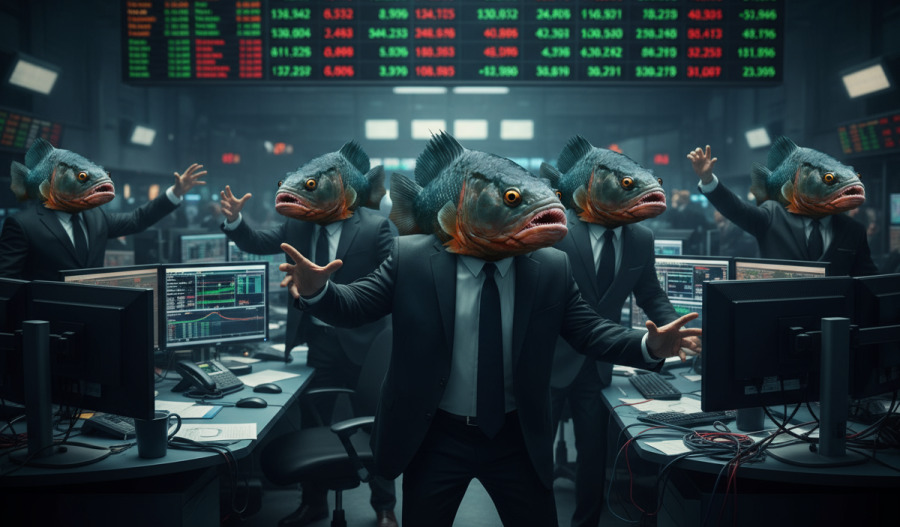All the top moves, shakes, and red-hot takes from Azzet's editorial team are right here in your weekly business wrap every Friday (3 October, 2025).
Silicon Valley's valuation fever
The AI arms race reached a new valuation milestone this week as OpenAI surpassed SpaceX to become the world's most valuable startup at US$500 billion (A$756.6 billion).
The ChatGPT maker's valuation jumped from $300 billion just months earlier, following a secondary share sale that allowed employees to offload $6.6 billion worth of stock.
The deal involved Thrive Capital, SoftBank, Dragoneer Investment Group, Abu Dhabi's MGX, and T. Rowe Price, with the company originally authorising up to $10.3 billion in shares for sale before settling on roughly two-thirds of that amount changing hands.
OpenAI's ascension came despite burning through $2.5 billion in the first half of 2025, with H1 revenue climbing 16% to US$4.3 billion as weekly users quadrupled to 700 million.
The company ended the half with around $17.5 billion in cash and securities while planning to build five AI data centres over the next three years at a projected cost of $400 billion, with Nvidia chipping in up to $100 billion.
ChatGPT alone brought in $2.7 billion in 2024, around 75% of total revenue, with new features like "Instant Checkout" helping diversify income streams.
Appfigures reported in August that ChatGPT's mobile app hit $2 billion in global consumer spending - roughly 30 times the combined lifetime spending of rivals including Claude, Copilot, and Grok.
The new valuation sees OpenAI eclipse Musk's SpaceX, valued at $456 billion, and intensifies competition for AI talent following reports of Meta offering nine-figure compensation packages to recruit top researchers.
The AI infrastructure spending spree continued as CoreWeave landed a $14.2 billion Meta deal running through December 2031 with options extending to 2032.
The neocloud provider's shares jumped 13% on the announcement, which came just days after it expanded its OpenAI agreement by $6.5 billion - bringing that total contract to $22.4 billion.
CoreWeave operates data centres packed with Nvidia graphics processing units that get rented out to AI developers, with the business model requiring constant debt market access to fund capital-intensive operations.
Meta's 2025 infrastructure expenses are expected to be between $114 billion and $118 billion, with CEO Mark Zuckerberg building superclusters the size of Manhattan and aiming for 1.3 million GPUs operational by year-end.
CEO Michael Intrator admits the company copped criticism during their IPO for customer concentration, with Microsoft historically accounting for 71% of revenue in the June quarter - though this Meta deal conveniently fixes that optics problem.
Anthropic's Claude Sonnet 4.5 scored 77.2% on SWE-bench Verified, outperforming OpenAI's GPT-5 and Google's Gemini 2.5 Pro on real-world software engineering benchmarks.
The model represents a jump from 42.2% to 61.4% on OSWorld testing in just four months - a 45% improvement.
Anthropic maintained unchanged pricing at $3 per million input tokens and $15 per million output tokens even as it cranked up performance, with company engineers watching Sonnet 4.5 churn through code for 30-plus hours without losing focus on complex projects.
Microsoft slotted Claude into Copilot 365 last week as OpenAI conceded Anthropic's edge on work-focused applications.
Etsy shares soared following OpenAI's announcement of new instant checkout features through ChatGPT, showing how AI integration is reshaping e-commerce infrastructure.
Elon Musk's fortune briefly touched $500 billion on Wednesday, exceeding the GDP of at least eleven nations, including Colombia, Chile, Peru, and Portugal.
A rise in the value of his 12.4% stake in Tesla helped push his net assets above the previously unattained half-trillion-dollar mark, according to Forbes' billionaires index.
The EV maker's share price advanced as investors welcomed his renewed focus on Tesla after a stint in politics with President Trump's team.
SpaceX is reportedly planning to raise money in a deal valuing his 42%-owned rocket firm at around $400 billion, even as 53%-held AI start-up xAI was reportedly seeking a $200 billion valuation in a capital raising which has not proceeded.
Musk hit the $100 billion mark in 2020, $200 billion and $300 billion in 2021, and $400 billion in December 2024, putting him on pace to become the first trillionaire by 2033 - assuming, of course, that these valuations bear any resemblance to reality.
Larry Ellison briefly overtook Musk as the richest person on the planet in September, but Musk has since relegated the Oracle founder back to second place with a net worth of about $350.7 billion.
Washington's shutdown circus
The United States government teetered toward another shutdown, with estimates suggesting 750,000 federal employees faced furloughs as Congress failed to agree on funding past 1 October.
The nonpartisan Congressional Budget Office estimated the total daily cost of furloughed compensation at roughly $400 million, with some agencies potentially furloughing more employees the longer a shutdown persisted.
Democrats demanded extensions for health insurance subsidies and reversals of July's Medicaid cuts, though Republicans refused to budge, voting down proposals from both sides.
The Senate voted down a spending bill that would fund the government at current levels until 21 November, which had been passed by the House of Representatives.
CBO warned the most recent 35-day shutdown from December 2018 to January 2019 permanently wiped $3 billion from GDP, lowering private sector demand for goods and services and reducing consumer spending - a lesson apparently lost on legislators more interested in theatre than governance.
Another 100,000 federal workers prepared to quit under the administration's deferred resignation programme, as Trump warned of mass firings in case of a government shutdown and ordered agencies to prepare firing plans for large numbers of employees.
At the same time, Trump cut federal funding to Democratic-led states and called on Microsoft to fire its global affairs head in a week where governance resembled performance art more than policy-making.
The president unveiled more tariffs on drugs, trucks, and cabinets as he renewed threats to tariff films - because apparently Hollywood needs protecting from international competition.
Pfizer struck a deal for tariff relief, illustrating how individual companies are navigating the administration's trade policies through bilateral negotiations rather than any coherent strategy.
Russia launched a massive drone-missile assault on Kyiv, with Russia warning U.S. missiles risked escalation.
Trump gave Hamas a deadline to accept a Gaza peace plan.
G7 nations pressured countries buying Russian oil, as the U.S. offered Ukraine more intelligence on Russia, signalling continued Western support despite diplomatic stalemates.
Chips, EVs, and industrial reality
Intel shares surged 7% on reports of early-stage discussions with AMD to manufacture chips at its struggling foundry business, extending year-to-date gains to a whopping 77%.
The discussions remain preliminary and may not result in a deal, with both companies declining to comment.
AMD currently has its chips made primarily by Taiwan's TSMC, though Intel lacks the technology to manufacture AMD's most advanced, profitable processors - meaning any initial arrangement would likely involve less sophisticated products.
For Intel's foundry business, which has been actively seeking major clients, landing AMD represents a substantial win.
According to Intel's July 2025 10-Q filing, Intel Foundry Services has been "unsuccessful to date" in attracting external demand, generating just $50 million in revenues from outside buyers year-to-date.
The division posted an operating loss of $3.17 billion in Q2 on sales of US$4.42 billion, up 3.2% year-on-year - the loss exacerbated by a $800 million impairment charge for equipment.
The discussions come as Intel has secured backing from the White House, Nvidia ($5 billion), SoftBank ($2 billion), and is pursuing investment from Apple - quite the lineup for a company that can't seem to attract paying customers.
Taiwan refused to agree to U.S. 50-50 chip production plan, asserting sovereignty over its semiconductor crown jewels even as Washington pushes domestic manufacturing.
Elsewhere, Samsung and SK Hynix prepared to supply chips for OpenAI's Stargate project.
Tesla posted record deliveries of 497,099 vehicles in Q3 just before the US$7,500 EV tax credit expired on 30 September.
The company beat FactSet estimates of 447,600, with deliveries up from 462,890 year-over-year.
Ford, General Motors, and Hyundai similarly reported record EV sales last quarter, underscoring how consumers respond when Uncle Sam picks up part of the tab.
Cox Automotive projects total new U.S. vehicle sales will be in the range of 15.8-16.4 million this year, with a 16.1 million baseline.
Around 16 million were sold in the country last year.
Yet across 2025's first three quarters, Tesla reported around 1.2 million deliveries, falling 6% from the same period in 2024 - turns out tax credits matter more than Elon's tweets.
Tesla's production declined year-over-year last quarter, dropping from 460,796 vehicles to 447,450.
The company previously said it would have a limited supply of vehicles in the U.S. during the quarter as it reconfigured supply chains amid U.S. tariffs.
Tesla EV registrations in the European Union fell by 36.6% in August, says the European Automobile Manufacturers' Association.
EV safety and Model Y door handles came under the microscope as regulators scrutinised the sector's rapid growth.
The U.S. government locked in Thacker Pass lithium supply, as Australian critical mineral miners discovered Uncle Sam wants their products.
Infrastructure stocks became AI boom winners with GIP bid talk lighting up AES shares, which rocketed 16.8%.
The Pentagon pushed missile makers to boost output, according to the Wall Street Journal - because defence spending remains one sector immune to belt-tightening rhetoric.
The British government guaranteed £1.5 billion for JLR, as Mitsubishi Estate committed £800 million to develop a London site.
And EA plans to abandon Wall Street Battlefield for a $50 billion payday.
Markets and dealmaking
Warren Buffett's Berkshire Hathaway confirmed it would acquire Occidental's OxyChem for $9.7 billion cash, marking the Oracle of Omaha's largest purchase since the $11.6 billion Alleghany buyout in 2022.
The deal expands Berkshire's chemical portfolio beyond Lubrizol, with OxyChem manufacturing commodity chemicals used in water treatment, pharmaceuticals, healthcare, and commercial and residential development.
Occidental said it expected to use $6.5 billion of the proceeds to reduce debt below $15 billion as planned following its acquisition of CrownRock.
Occidental President and CEO Vicki Hollub said the transaction strengthens the company's financial position and "catalyses a significant resource opportunity we've been building in our oil and gas business for the last decade", unlocking more than 20 years of low-cost resource "runway".
Berkshire is also Occidental's largest shareholder, having started building its stake in February 2022 when Russia invaded Ukraine - Buffett's timing, as usual, impeccable.
The transaction is expected to close in the fourth quarter of 2025, subject to regulatory approvals.
U.S. pending home sales rose in August even as job openings stagnated and consumer confidence dropped, painting a mixed picture of economic health.
The private sector shed 32,000 jobs in September, yet Cotality home prices logged fastest monthly rise since 2023, illustrating housing markets disconnected from employment fundamentals.
Google laid off over 100 employees in its cloud unit, as Lufthansa cut 4,000 jobs and leaned on AI for its profit push.
Carnival posted record income and revenue on strong bookings, as Nike shares strengthened despite Q1 earnings drop - markets care more about narratives than numbers.
Fintech platform Wealthfront filed for IPO even as gold prices set for their biggest monthly gain in 14 years, suggesting investors remain unconvinced about equity valuations despite fresh all-time highs.
U.S. oil companies cut thousands of jobs in August, as investors pondered whether it's time for safe bets on small-cap revival and learnt why investing with active fund managers can be dicey.
The MFA called for safeguards on private assets in 401(k)s, Cook remained on the job as the Supreme Court scheduled a January meeting, and Bristow's departure raised questions about Barrick's Mali chaos finally resting.
Down Under developments
The Labor government posted a lower-than-expected deficit, as Australian dwelling approvals extended declines in August, and Australia's trade surplus fell as gold exports slumped.
The RBA held rates at 3.6% as inflation and growth risks linger.
ASIC flagged greater PC anxiety after La Trobe's stop order, though a superannuation retirement test left most funds ticked off.
SMSFs cashed up ahead of tax hikes, highlighting Australians' knack for staying one step ahead of legislative changes.
Albanese courted Lulu in the Coles-Woolies shake-up - because apparently, introducing a third major supermarket will solve market concentration concerns that decades of regulatory oversight couldn't address.



